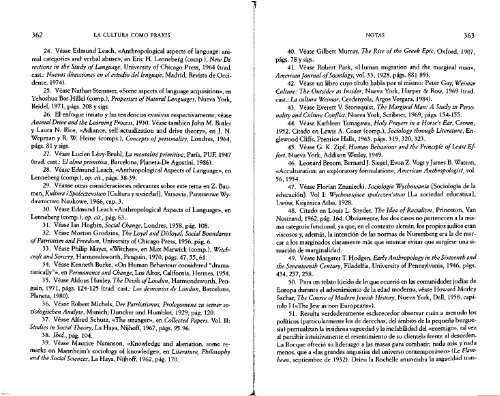Zygmunt Bauman La cultura como praxis
Zygmunt Bauman La cultura como praxis
Zygmunt Bauman La cultura como praxis
Create successful ePaper yourself
Turn your PDF publications into a flip-book with our unique Google optimized e-Paper software.
362 LA CULTURA COMO PRAXIS<br />
24. Véase Edmund Leach, «Anthropological aspects of language: animal<br />
categories and verbal abuse», en Eric H. Lenneberg (comp.), New Directions<br />
in the Study of <strong>La</strong>nguage, University of Chicago Press, 1964 (trad.<br />
cast.: Nuevas direcciones en el estudio del lenguaje, Madrid, Revista de Occidente,<br />
1974).<br />
25. Véase Nathan Stemmer, «Some aspects of language acquisition», en<br />
Yehoshua Bar-Hillel (comp.), Properties of Natural <strong>La</strong>nguages, Nueva York,<br />
Reidel, 1971, págs. 208 y sigs.<br />
26. El enfoque innato y las tendencias evasivas respectivamente; véase<br />
Animal Dríve and the Learning Process, 1930. Véase también John M. Butler<br />
y <strong>La</strong>ura N. Rice, «Adiance, self-actualization and drive theory», en J. N.<br />
Wepman y R. W. Heine (comps.), Concepts of personality, Londres, 1964,<br />
págs. 81 y sigs.<br />
27. Véase Lucien Lévy-Bruhl, <strong>La</strong> mentalitéprímitive, París, PUF, 1947<br />
(trad. cast.: El alma primitiva, Barcelona, Planeta-De Agostini, 1986).<br />
28. Véase Edmund Leach, «Anthropological Aspects of <strong>La</strong>nguage», en<br />
Lenneberg (comp.), op. cit., págs. 38-39.<br />
29. Véanse otras consideraciones relevantes sobre este tema en Z. <strong>Bauman</strong>,<br />
Kultura i Spoleczenstwo [Cultura y sociedad], Varsovia, Pantswowe Wydawnictwo<br />
Naukowe, 1966, cap. 3.<br />
30. Véase Edmund Leach «Anthropological Aspects of <strong>La</strong>nguage», en<br />
Lenneberg (comp.), op. cit., pág. 63.<br />
31. Véase lan Hogbin, Social Change, Londres, 1958, pág. 108.<br />
32. Véase Morlón Grodzins, The Loyal and Disloyal, Social Boundaríes<br />
ofPatriotísm andFreedom, University of Chicago Press, 1956, pág. 6.<br />
33. Véase Philip Mayer, «Witches», en Max Marwick (comp.), Witchcraft<br />
andSorcery, Harmondsworth, Penguin, 1970, págs. 47, 55, 61.<br />
34. Véase Kenneth Burke, «On Human Behaviour considered "dramatistically"»,<br />
en Permanence and Change, Los Altos, California, Kermes, 1954.<br />
35. Véase Aldous Huxley, The Devils ofLoudun, Harmondsworth, Penguin,<br />
1971, págs. 124-125 (trad. cast.: Los demonios deLoudun, Barcelona,<br />
Planeta, 1980).<br />
36. Véase Robert Michels, Der Patríotismus, Prolegómeno zu seiner soziologischen<br />
Analyse, Munich, Duncker und Humblot, 1929, pág. 120.<br />
37. Véase Alfred Schutz, «The stranger», en Collected Papers. Vol. II:<br />
Studies in Social Theory, <strong>La</strong> Haya, Nijhoff, 1967, págs. 95-96.<br />
38. Ibid.,pág. 104.<br />
39. Véase Maurice Natanson, «Knowledge and alienation, some remarks<br />
on Mannheim's sociology of knowledge», en Literature, Philosophy<br />
and the Social Sciences, <strong>La</strong> Haya, Nijhoff, 1962, pág. 170.<br />
NOTAS 363<br />
40. Véase Gilbert Murray, The Rise of the Greek Epic, Oxford, 1907,<br />
págs. 78 y sigs.<br />
41. Véase Robert Park, «Human migration and the marginal man»,<br />
American Journal of Sociology, vol. 33, 1928, págs. 881-893.<br />
42. Véase un libro cuyo título habla por sí mismo: Peter Gay, Weimar<br />
Culture: The Outsider as Insider, Nueva York, Harper & Row, 1969 (trad.<br />
cast.: <strong>La</strong> <strong>cultura</strong> Weimar, Cerdanyola, Argos Vergara, 1984).<br />
43. Véase Everett V. Stonequist, The Marginal Man: A Study in Personality<br />
and Culture Conflict, Nueva York, Scribner, 1969, págs. 154-155.<br />
44. Véase Kathleen Tamagawa, Holy Prayers in a Horse's Ear, Crown,<br />
1952. Citado en Lewis A. Coser (comp.), Sociology through Literature, Englewood<br />
Cliffs, Prentice Halls, 1963, págs. 319, 320, 323.<br />
45. Véase G. K. Zipf, Human Behaviour and the Principie ofLeast Effort,<br />
Nueva York, Addison Wesley, 1949.<br />
46. Leonard Broom, Bernard J. Siegel, Evon Z. Vogt y James B. Watson,<br />
«Ac<strong>cultura</strong>tion: an exploratory formulation», American Anthropologist, vol.<br />
56,1954.<br />
47. Véase Florian Znaniecki, Socjologia Wychowania [Sociología de la<br />
educación], Vol I: Wychowujace spoleczen'stwo [<strong>La</strong> sociedad educativa],<br />
Lwow, Ksiaznica Atlas, 1928.<br />
48. Citado en Louis L. Snyder, The Idea ofRacialism, Princeton, Van<br />
Nostrand, 1962, pág. 164. Obviamente, los dos casos no pertenecen a la misma<br />
categoría funcional, ya que, en el contexto alemán, los propios judíos eran<br />
viscosos y, además, la intención de las normas de Nuremberg era la de marcar<br />
a los marginados claramente más que intentar evitar que surgiese una situación<br />
de marginalidad.<br />
49. Véase Margaret T. Hodgen, Early Anthropology in the Sixteenth and<br />
the Seventeenth Century, Filadelfia, University of Pennsylvania, 1946, págs.<br />
434, 257, 258.<br />
50. Para un relato lúcido de lo que ocurrió en las comunidades judías de<br />
Europa durante el advenimiento de la edad moderna, véase Howard Morley<br />
Sachar, The Course ofModern Jewish History, Nueva York, Dell, 1958, capítulo<br />
I («The Jew as non Europeans»).<br />
51. Resulta verdaderamente esclarecedor observar cuan a menudo los<br />
políticos (particularmente los de derechas, del ámbito de la pequeña burguesía)<br />
puntualizan la insidiosa vaguedad y la inefabilidad del «enemigo», tal vez<br />
al percibir intuitivamente el resentimiento de su clientela frente al desorden.<br />
<strong>La</strong> Rocque ofreció su liderazgo a las masas para combatir, nada más y nada<br />
menos, que a «las grandes angustias del universo contemporáneo» (Le Flambeau,<br />
septiembre de 1932). Drieu la Rochelle anunciaba la sagacidad tran-


